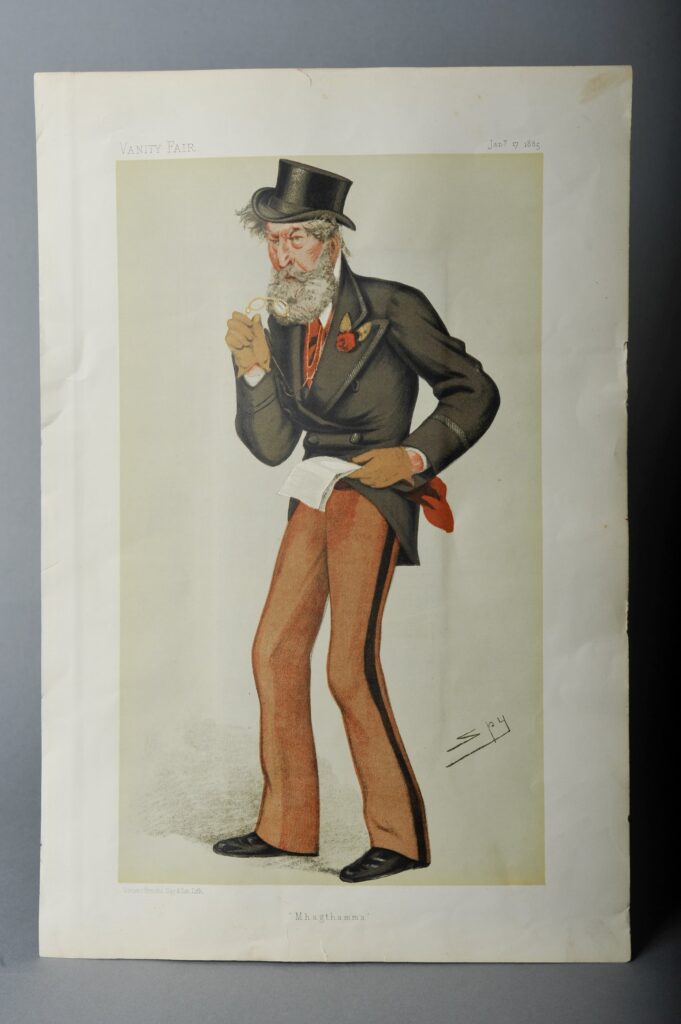Explore
Print, colour, unframed, of the O'Gorman Mahon, from Vanity Fair, Jan 17, 1885, short biography printed on reverse

Print, colour, unframed, of the O’Gorman Mahon, from Vanity Fair, Jan 17, 1885 a short biography printed in the same issue is glued to the reverse. The print shows an image of a man which is contained within a pale green background around which is a white area forming a frame. The man depicted is old, slightly stooped and holds a pair of spectacles in one hand and a letter or document in the other. He wears black shoes, brown coloured pants with a black stripe at the side of the leg, a green coat with tails from which a red handkerchief is visible protruding from one pocket, and with a red rose in his button hole, he also wears tan gloves, a red cravat, white shirt, and short black top hat. His hair is grey and he has a grey beard. The image is signed on the bottom right “Spy”. The white area surrounding the image contains printed text as follows: above the right hand corner of the image are the words “VANITY FAIR” and above the left hand corner “Jany. 17 1885”. Below bottom right hand corner is the name “Vincent Brooks, Day & Son, Lith.” and in the centre “Mhaghamma”. The attached printed text on the reverse is contained within a black border and reads “VANITY FAIR./LONDON, JANUARY 17, 1885./STATESMAN. – No. CCCCLVIII./COLONEL JAMES PATRICK O’GORMAN MAHON, M.P./BORN of a race of illustrious and martial chieftains/eight-one years ago, James Patrick O’Gorman/Mahon, the son of hte daughter of The O’Gorman and/of Pahdraic Mor, J.P., fully represents in his own/magnificent person all the qualities of that native/nobility which as been the pride and curse of Ireland/from time immemorial. In his youth his high intel-/lectual capacities enabled him to attain with consider-/able ease the degree of B.A. and, ten years after-/wards, that of M.A., at Trinity College, Dublin; while/the natural martial instincts of his race early impelled/him into the Clare Militia, and justified his subsequent/appointment as Aide-de-Camp to the President of Costa/Rica. He represented the County Clare in the Legis-/lative Chamber of the tyrant Saxon before the days of/the 1832 Reform Bill, and Ennis from 1847 to 1852/enjoyed the advantage of his services. He then/retired disgusted from the political arena for awhile,/only to return in the prime of his years on the wave/of awakened Irish politics in 1879./He has been a wanderer in many lands, where he/has seen strange sights and executed doughty deeds,/and he regards with amazement not unmixed with/repulsion the rising generation of shoddy shopmen, who/in their turn instinctively uncover before the man who/claims to be called “Mhagthamma,” and who more-/over has stood before his man in mortal combat many/a time and oft without a shiver./He is one-and-eighty years of age, is courteous,/graceful, and extremely dignified. He is naturally a/Home Ruler, but not a Nationalist or a Land/Leaguer; and since he sympathises with neither daggers/nor dynamite, he properly fulfils the duties of a/Justice of the Peace. He is the cousin of “The Major”./Jehu Junior.”
Category: Visual Representation